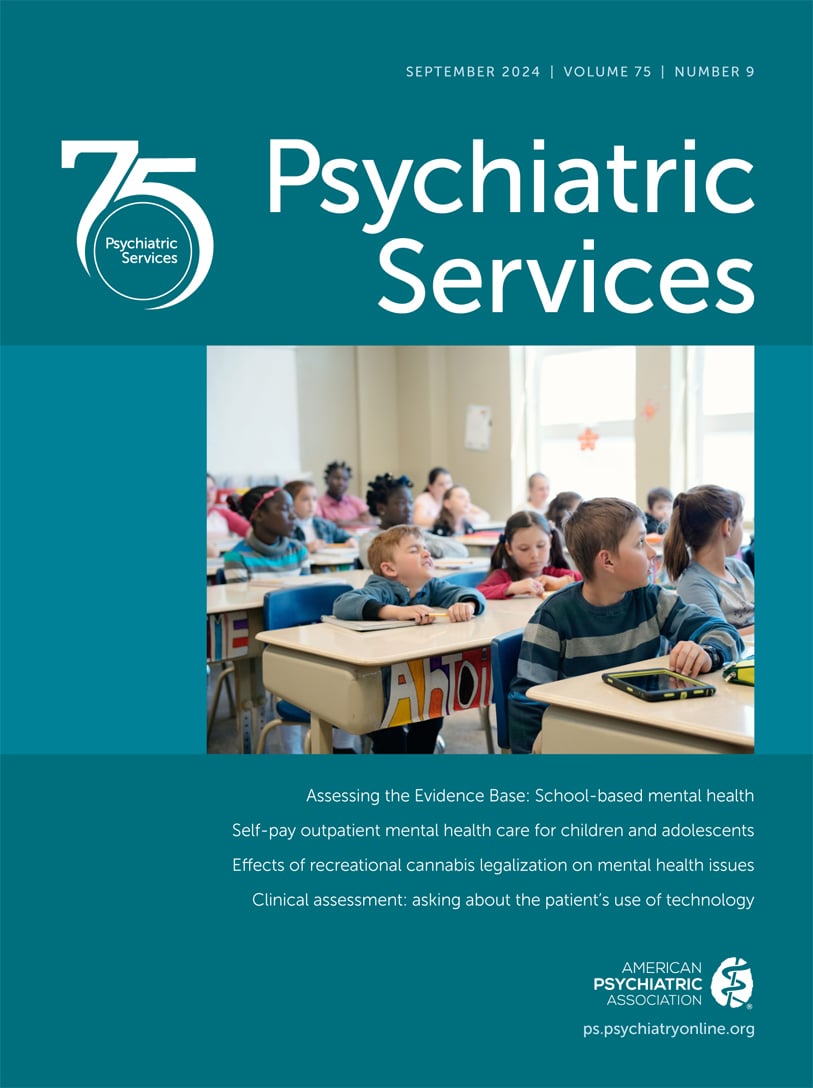Psychiatric Services
- Volume 46
- Number 1
- January 1995
Publication date: 01 January 1995
Pages29–35Memory loss and other cognitive dysfunctions, although common in elderly persons, are not universal features of old age. Instead they herald the presence of various neuropsychiatric diseases, which are first recognized as syndromes. The two most common ...
https://doi.org/10.1176/ps.46.1.29Article
Publication date: 01 January 1995
Pages36–42Although anxiety disorders appear to occur less frequently in elderly persons, subsyndromal anxiety and anxiety associated with other medical and psychiatric disorders are significant sources of morbidity. Theories of etiology of anxiety range from the ...
https://doi.org/10.1176/ps.46.1.36Publication date: 01 January 1995
Pages43–48Existing data on the treatment, course, and outcome of depression are not representative of the older depressed person who is most frequently encountered in clinical practice. If mental health services are to become more effectively applied, late-life ...
https://doi.org/10.1176/ps.46.1.43Publication date: 01 January 1995
Pages49–55Sleep complaints are common in geriatric patients. The clinician's first task is to separate sleep problems originating in the physiologic changes of aging from those originating in pathological processes. Normal elderly persons have greater difficulty ...
https://doi.org/10.1176/ps.46.1.49Publication date: 01 January 1995
Pages55–59Literature of the past ten years is reviewed to examine psychosocial, psychiatric, organic, and general medical causes of psychotic symptoms in persons over age 65. Being bedfast with poor caretaker relationships and being socially isolated are risk ...
https://doi.org/10.1176/ps.46.1.55Publication date: 01 January 1995
Pages60–65OBJECTIVES: The goals of this study were to determine the extent of staff members' support for family involvement in residential treatment centers for children, to examine staff members' beliefs about families and the consequences of their involvement, ...
https://doi.org/10.1176/ps.46.1.60Publication date: 01 January 1995
Pages66–72OBJECTIVES: This study examined the relationship between substance abuse patients' length of stay in community residential facilities and their outpatient mental health aftercare and readmission for inpatient care. METHODS: A national sample of 1,070 ...
https://doi.org/10.1176/ps.46.1.66Publication date: 01 January 1995
Pages73–78OBJECTIVE: This longitudinal study examined various dimensions of the lives of patients with chronic mental illness immediately before and again several years after their discharge from a state hospital into well-staffed structured community residential ...
https://doi.org/10.1176/ps.46.1.73Publication date: 01 January 1995
Pages79–81A total of 194 mental health care providers in Arkansas, primarily from rural areas and small communities, participated in a four-hour training program designed to improve their knowledge about the psychosocial and neuropsychiatric aspects of HIV and ...
https://doi.org/10.1176/ps.46.1.79Publication date: 01 January 1995
Pages81–83Community mental health centers in Iowa were surveyed by mail in 1993 to obtain quantitative data on the utilization of psychiatrists at the centers. Responses from all 37 centers indicated that they employed a total of 34 full-time-equivalent (FTE) ...
https://doi.org/10.1176/ps.46.1.81Publication date: 01 January 1995
Pages83–85A patient satisfaction questionnaire used by a private, nonprofit psychiatric hospital was revised to include issues considered important by patients. Focus groups were used to obtain patients' written responses to general questions about the essential ...
https://doi.org/10.1176/ps.46.1.83Article
Past Issues
View Issues Archive
Vol. 75 | No. 12

Vol. 75 | No. 11

Vol. 75 | No. 10
